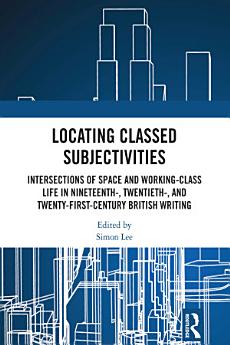Locating Classed Subjectivities: Intersections of Space and Working-Class Life in Nineteenth-, Twentieth-, and Twenty-First-Century British Writing
Simon Lee
Mai 2022 · Routledge
E-Book
250
Seiten
family_home
Zulässig
info
reportBewertungen und Rezensionen werden nicht geprüft Weitere Informationen
Über dieses E-Book
Locating Classed Subjectivities explores representations of social class in British fiction through the lens of spatial theory and analysis. By analyzing a range of class-conscious texts from the nineteenth-, twentieth-, and twenty-first centuries, the collection provides an overview of the way British writers mobilized spatial aesthetics as a means to comment on the intricacies of social class. In doing so, the collection delineates aesthetic strategies of representation in British writing, tracing the development of literary forms while considering how authors mobilized innovative spatial metaphors to better express contingent social and economic realities. Ranging in coverage from early-nineteenth-century narratives of disease to contemporary writing on the working-class millennial, Locating Classed Subjectivities offers new perspectives on literary techniques and political intentions, exploring the way class is parsed and critiqued through British writing across three centuries. As such, the project responds to Nigel Thrift and Peter Williams’s claim that literary and cultural production serves as a particularly rich yet unexamined access point by which to comprehend the way space and social class intersect.
Autoren-Profil
Simon Lee is Assistant Professor of English at Texas State University where he researches and teaches post-war British Literature with a particular focus on working-class writing and culture. He has published a range of scholarship on British writing, specifically authors like Alan Sillitoe, Shelagh Delaney, Colin MacInnes, Nell Dunn, and John Osborne.
Dieses E-Book bewerten
Deine Meinung ist gefragt!
Informationen zum Lesen
Smartphones und Tablets
Nachdem du die Google Play Bücher App für Android und iPad/iPhone installiert hast, wird diese automatisch mit deinem Konto synchronisiert, sodass du auch unterwegs online und offline lesen kannst.
Laptops und Computer
Im Webbrowser auf deinem Computer kannst du dir Hörbucher anhören, die du bei Google Play gekauft hast.
E-Reader und andere Geräte
Wenn du Bücher auf E-Ink-Geräten lesen möchtest, beispielsweise auf einem Kobo eReader, lade eine Datei herunter und übertrage sie auf dein Gerät. Eine ausführliche Anleitung zum Übertragen der Dateien auf unterstützte E-Reader findest du in der Hilfe.







